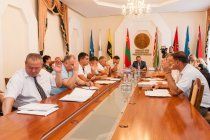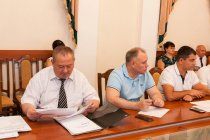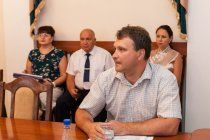 Русский
Русский English
English-







Spring session is in the finishing straight
The last plenary meetings of the spring session of the Supreme Council are scheduled for July 10 and 17. Members of the presidium of the parliament at the last meeting decided on their work agendas. On July 17, in accordance with the norms of the Constitution and current legislation, the head of Government will submit to the deputies a report on the activities of the highest executive body in 2018. The Supreme Council received written answers to questions sent to the Government in advance by the deputies. They were summarized during the meeting of the parliamentary commission on mandates, regulations and deputy ethics. On July 10, the plenary session of the Supreme Council will preface the message of President Vadim Krasnoselsky. The President will address the Pridnestrovian people and state authorities.
A group of deputies of the Committee on the Issues of the Agrarian and Industrial Complex made a legislative initiative proposing amendments to the existing norms of the law On the Social Protection of Children of War. It is about changing the date of registration of children of war from May 9, 1945, when the Great Patriotic War ended on September 2 1945 when the Second World War ended. Currently, this law does not secure social guarantees for the state to provide benefits to this category of citizens - they are issued only appropriate certificates. Moreover, the law on the republican budget for 2019 stipulates that during the financial year no legislative decisions should be taken on the granting of additional benefits.
The ensuing controversy revealed a certain difference in the opinions of the members of the presidium regarding the term for taking into account this category of citizens (before May 9, 1945 or before September 2, 1945). A point in this matter will be set during the meetings of parliamentary committees and the joint discussion of the draft law by all deputies.
It is noteworthy that Ukraine was the first to establish the status of children of war. There is no such federal law in Russia (with the corresponding law-in-draft submitted to the State Duma), although it is valid in some regions of the Russian Federation.
Before the end of the spring session, the parliamentarians will have to adopt the amendments to the Land Code, initiated by the deputies of the Committee in the second reading. The essence of the law-in-draft developed by them is the ability to exchange a land plot for another land plot with the consent of the authorized state authorities in charge of the land plots, subject to compliance with the requirements stipulated by the Land Code.
One of the legislative initiatives of the Government, which will be submitted for discussion by people's deputies in the second reading, complements the current norms of the Code on Administrative Offenses. Amendments and additions to the current provisions of the Administrative Code have been developed with the aim of increasing the effectiveness of the fight against quarantine, especially dangerous and dangerous pests of plants, pathogens of plant diseases, weed plants. The draft law proposes to expand the list of services that will carry out control measures and draw up protocols on administrative punishment at the expense of employees of the Ministry of Internal Affairs. Currently, these powers are vested in the State Supervision Service of the Ministry of Justice.
A group of parliamentarians acted as developers of law-in-draft on amending the Law on Environmental Protection. Its essence is the possibility of using the funds of the Ecological Fund, including the purchase of special equipment designed for the disposal of solid waste. This is due to the fact that at the current legislative level it has been established that subscribers pay for the removal of solid waste either by concluding an agreement with a specialized organization or by charging tax payment. Techniques for the removal of solid waste are not enough or it is outdated.
Thus, the legislative initiative of parliamentarians is aimed at improving the quality of services provided by organizations that collect and export solid household waste, as well as the effective implementation of state policy in the sphere of environmental safety.







